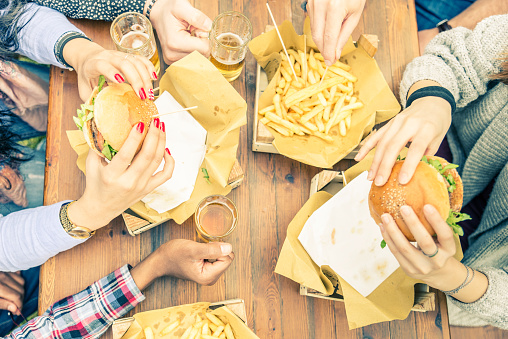Are you a mindless muncher? A comfort food connoisseur? Or a break-up binger? Don’t be ashamed. For many people, emotions and food are so intertwined, it’s hard to differentiate between eating for fuel and feeding your feelings.
Hence the term, “emotional eating.”
There are two types of hunger—emotional and physical. Emotional hunger is the need to eat when physical hunger isn’t present. It is essentially feeding our feelings with food.
Emotional eating is a vice. Food elicits a wide array of hormones and chemicals that dance around in our brains, sending us feelings of comfort, happiness and ease. According to the National Institute of Health, eating releases dopamine, which activates the pleasure center of the brain. The long and short of it? Food makes us feel good.
And while studies suggest thatpeople with a body mass index (BMI) in the overweight or obese range more commonly turn to food as a coping mechanism, determining the reason for thus is a bit of a “chicken and egg” situation; there is an ongoing debate over whether the binging tendency or the weight gain comes first.
Like many vices, emotional eating is a health concern. It is obvious that eating beyond your physical needs can cause serious weight gain. And with excess weight comes an increased risk for diseases like cardiovascular diseases, diabetes, among others. Eating disorders can also develop when emotional hunger is accompanied by cycles of binging and purging. But the signs aren’t always so extreme or so obvious.
So how do you know if you’re an emotional eater?
Here are five common indicators that emotional eating is a problem for you:
1. You Turn to Food When You’ve Had an Argument with A Loved One
File this one under comfort food or food for comfort.
Difficult emotions are, well, difficult. An argument can cause stress hormones to spike. Initially, stress may decrease appetite, but as the stress persists, hormones are released that can increase your cravings. During prolonged periods of stress, appetite can remain high regardless of physical hunger or nutritional needs.
Unfortunately, carrot sticks and celery boats may not be enough to satisfy your stress-induced appetite either. Studies have found emotional hunger causes very specific cravings. Sad people prefer ice cream and cookies, not salad and broccoli.
2. You Overeat While Working Late or Studying
The big issue with emotional hunger is that we eat more than we normally would, which puts us at risk for weight gain. Psychologists call this unconscious eating. While performing a task like studying or working on a big project, we can let ourselves become too tired and too hungry. Hormones go crazy and send sudden urges to your brain requesting food. We polish off the entire bag of chips, box of cookies or gallon of soda. We finish the rest of the pizza or find ourselves elbow deep in a big bowl of buttery popcorn. Overconsumption of calories leads to obesity. Consuming foods high in sodium leads to hypertension. Saturated-fat-laden treats endanger our hearts. Unconscious eating, while seemingly innocent, can become a danger to our health.
3. You Turn To Food When You’re Bored
The American Psychological Association found in 2012 that when boredom was added to the emotional eating scale it became the most commonly cited emotion while eating. Cravings can be specific for bored eating, too. Research has shown that people who eat out of boredom crave salty, crunchy snacks. Eating these foods releases chemicals in the brain similar to chemicals released by some drugs. Like a drug, food creates a soothing, calming effect. That’s why we look forward to food when things get a bit wearisome. As with all forms of emotional eating, eating because of boredom leads to extra calories, possibly spiraling into significant weight gain. Even in the absence of stress or sadness, bored eating can be the root of a failed weight loss effort or sudden jump on the scale.
4. You Hide What You Eat
But why? Emotional hunger feels sudden and urgent. It’s irrational. We make bad choices. We eat too much. This causes feelings of guilt. The guilt can then create feelings of shame, which may further fuel the binge. The National Eating Disorder Association lists secretive behaviors such as eating alone, hiding or hoarding food as a behavioral characteristic of binge eating.
Shame and guilt are powerful emotions. A 2014 study found that feelings of shame coupled with anxiety elicited larger binge episodes in women compared to anxiety alone.
5. You Eat When You’re Anxious
We all get anxious: A new job, a big meeting, an intense social gathering… A study in 2012 found that higher rates of anxiety in college woman correlated with higher reports of emotional eating. At the beginning of the semester, anxiety was at its peak, with new classes, new faces and new adjustments. Of course, emotional eating was at its highest then, as the college students coped with this anxiety.
As far back as 1957, research has confirmed that overeating can be a means of easing emotional discomfort and anxiety. To complicate the issue even more, overconsuming high fatcomfort foods can exacerbate negative emotions and stress. Hence, the vicious cycle of overeating and anxiety sets in motion.
Emotional eating, regardless of the source, is certainly a cause for concern. The longer the cycle continues, the more difficult it could be to break from it. The key is finding new ways to cope with the underlying stress, anxiety and boredom, that don’t involve food.
The next time an emotional experience has you plunging into the pantry, throw on your sneakers and head outside for a brisk stroll instead. A number of studies indicate that participating in aerobic exercise can help decrease tension, boost mood, improve sleep and improve self-esteem. The best part? You could experience anti-anxiety effects after just five minutes of aerobic exercise. Or, step away from the snacks and reach for the radio instead. Studies suggest that listening to music can elevate your mood and reduce stress levels. (Check out this article for even more reasons to crank up the tunes today).
Have a pet? Cash in on some extra cuddle time. Studies suggest that spending time with animals can help boost your mood and alleviate feelings of loneliness. Want even more reason to pamper your pet today? We’ve got you covered with this article: 8 Reasons Your Pet is Good for Your Health.
Other strategies for avoiding emotional eating? Try calling a friend to discuss how you’re feeling, or tackling that closet clean-out project you’ve been putting off. And, if you find that you absolutely cannot cope without sitting down to a snack, make sure you opt for a healthier version of the food you’re craving. If it’s ice cream you’re after, try one of these “Nice Cream” recipes. If crunchy, salty stuff has your heart, try making your own veggie chips or fries . You can also stock up on your favorite Nutrisystem snacks, so you’ve got healthy options on hand when cravings strike. Here is a list of the 20 most popular Nutrisystem snacks and sweets.
The post 5 Signs You’re Prone to Emotional Eating appeared first on The Leaf.
from The Leaf https://ift.tt/2D07LS1









No comments:
Post a Comment